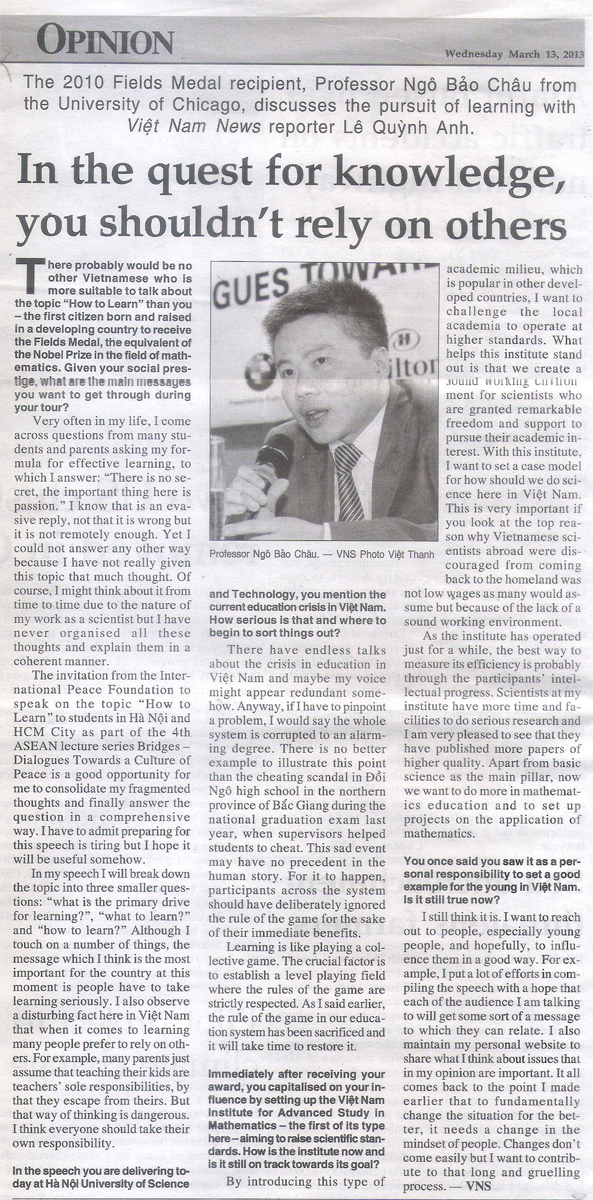|
| |
 |
|
In the quest for knowledge, you shouldn't rely on others
|
Vietnam News, 13 March 2013
http://vietnamnews.vn/opinion/236527/in-the-quest-for-knowledge-you-shouldnt-rely-on-others.html

There probably would be no other Vietnamese who is more suitable to talk about the topic "How to Learn" than you – the first citizen born and raised in a developing country to receive the Fields Medal, the equivalent of the Nobel Prize in the field of mathematics. Given your social prestige, what are the main messages you want to get through during your tour?
Very often in my life, I come across questions from many students and parents asking my formula for effective learning, to which I answer: "There is no secret, the important thing here is passion." I know that is an evasive reply, not that it is wrong but it is not remotely enough. Yet I could not answer any other way because I have not really given this topic that much thought. Of course, I might think about it from time to time due to the nature of my work as a scientist but I have never organised all these thoughts and explain them in a coherent manner.
The invitation from the International Peace Foundation to speak on the topic "How to Learn" to students in Ha Noi and HCM City as part of the 4th ASEAN lecture series Bridges – Dialogues Towards a Culture of Peace is a good opportunity for me to consolidate my fragmented thoughts and finally answer the question in a comprehensive way. I have to admit preparing for this speech is tiring but I hope it will be useful somehow.
In my speech I will break down the topic into three smaller questions: "what is the primary drive for learning?", "what to learn?" and "how to learn?" Although I touch on a number of things, the message which I think is the most important for the country at this moment is people have to take learning seriously. I also observe a disturbing fact here in Viet Nam that when it comes to learning many people prefer to rely on others. For example, many parents just assume that teaching their kids are teachers' sole responsibilities, by that they escape from theirs. But that way of thinking is dangerous. I think everyone should take their own responsibility.
In the speech you are delivering today at Ha Noi University of Science and Technology, you mention the current education crisis in Viet Nam. How serious is that and where to begin to sort things out?
There have endless talks about the crisis in education in Viet Nam and maybe my voice might appear redundant somehow. Anyway, if I have to pinpoint a problem, I would say the whole system is corrupted to an alarming degree. There is no better example to illustrate this point than the cheating scandal in Doi Ngo high school in the northern province of Bac Giang during the national graduation exam last year, when supervisors helped students to cheat. This sad event may have no precedent in the human story. For it to happen, participants across the system should have deliberately ignored the rule of the game for the sake of their immediate benefits.
Learning is like playing a collective game. The crucial factor is to establish a level playing field where the rules of the game are strictly respected. As I said earlier, the rule of the game in our education system has been sacrificed and it will take time to restore it.
Immediately after receiving your award, you capitalised on your influence by setting up the Viet Nam Institute for Advanced Study in Mathematics – the first of its type here – aiming to raise scientific standards. How is the institute now and is it still on track towards its goal?
By introducing this type of academic milieu, which is popular in other developed countries, I want to challenge the local academia to operate at higher standards. What helps this institute stand out is that we create a sound working environment for scientists who are granted remarkable freedom and support to pursue their academic interest. With this institute, I want to set a case model for how should we do science here in Viet Nam. This is very important if you look at the top reason why Vietnamese scientists abroad were discouraged from coming back to the homeland was not low wages as many would assume but because of the lack of a sound working environment.
As the institute has operated just for a while, the best way to measure its efficiency is probably through the participants' intellectual progress. Scientists at my institute have more time and facilities to do serious research and I am very pleased to see that they have published more papers of higher quality. Apart from basic science as the main pillar, now we want to do more in mathematics education and to set up projects on the application of mathematics.
You once said you saw it as a personal responsibility to set a good example for the young in Viet Nam. Is it still true now?
I still think it is. I want to reach out to people, especially young people, and hopefully, to influence them in a good way. For example, I put a lot of efforts in compiling the speech with a hope that each of the audience I am talking to will get some sort of a message to which they can relate. I also maintain my personal website to share what I think about issues that in my opinion are important. It all comes back to the point I made earlier that to fundamentally change the situation for the better, it needs a change in the mindset of people. Changes don't come easily but I want to contribute to that long and gruelling process. — VNS
|
|
|
